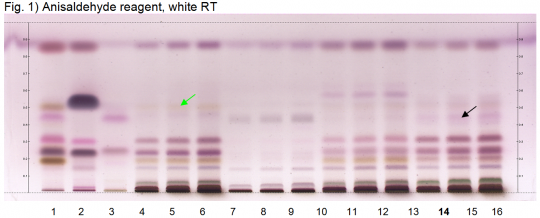Salvia fruticosa (leaf)
(addition of hptlc info.--jd) |
(Nomenclature updated) |
||
| Line 1: | Line 1: | ||
| − | = | + | =Nomenclature= |
| − | + | ||
| + | {{nomenclature | binomial=Salvia fruticosa | ||
| + | |authority=Mill. | ||
| + | |family=Lamiaceae | ||
| + | |scn=three-lobe sage | ||
| + | |syn=''Salvia triloba'' L. f. | ||
| + | |ayurvedic= | ||
| + | |pinyin= | ||
| + | |aka=Greek sage | ||
| + | |notes= }} | ||
=Macroscopic Entries= | =Macroscopic Entries= | ||
Revision as of 21:37, 14 March 2014
Contents |
Nomenclature
Salvia fruticosa Mill. Lamiaceae
Syn. Salvia triloba L. f.
Standardized common name (English): three-lobe sage
Macroscopic Entries
Microscopic Entries
HPTLC Entries
|
Three-lobed sage (leaf) (Salvia fruticosa, syn. S. triloba) Lane Assignments Lanes, from left to right (Track, Volume, Sample):
Reference Sample(s) Reference: Dissolve 5 mg of thujon in 1 mL of methanol. Dissolve 25 µL of cineole in 10 mL of toluene. Stationary Phase Stationary phase, i.e. Silica gel 60, F254 Mobile Phase Dichloromethane Sample Preparation Method Sample: Mix 500 mg of powdered sample with 5 mL of methanol and sonicate for 10 minutes, then centrifuge or filter the solutions and use the supernatants / filtrates as test solutions. Derivatization reagent: Anisaldehyde reagent, Preparation: 170 mL of ice-cooled methanol add 20 mL of glacial acetic acid, 10 mL of sulfuric acid and 1 mL of anisaldehyde, Use: spray, heat at 100°C for 5 min. Detection Method Saturated chamber; developing distance 70 mm from lower edge; relative humidity 33% Other Notes Images presented in this entry are examples and are not intended to be used as basis for setting specifications for quality control purposes. System suitability test: Thujon: violet zone at Rf ~ 0.47; Cineole: violet zone at Rf ~ 0.27. Identification: Compare result with reference images. The fingerprint of the test solution is similar to that of the corresponding botanical reference sample. Additional weak zones may be present. The chromatogram of the test solution shows a violet zone just below the solvent front. A diffuse violet zone is seen at the position of thujon (black arrow). There is a violet zone at Rf ~ 0.30 and slightly below reference cineole there is another violet zone. A brown zone is seen at Rf ~ 0.20 and there is a blue violet zone just below it. Test for other species: No yellow zone is seen at Rf ~ 0.50 (Sage leaf, green arrow).
|
Other Points of Interest
Cite error: <ref> tags exist, but no <references/> tag was found
